History of Parliamentarism in BiH
Parliamentary assembly of Bosnia and Herzegovina from 1996. until today
(Monographs of the "Parliamentary Assembly of Bosnia and Herzegovina, the 2010 edition.)
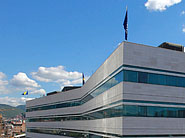
First convocation of the Parliamentary Assembly of Bosnia and Herzegovina (1996 – 1998)
Pursuant to Annex 3 of the Dayton Peace Agreement, the first post-war elections in our country were held on September 13 and 14, 1996. They brought nothing new in comparison with the elections held in 1990. Again, most votes were won by the Party for Democratic Action of Bosnia and Herzegovina (SDA), the Serbian Democratic Party (SDS) and the Croatian Democratic Union of Bosnia and Herzegovina (HDZ). From the Federation of Bosnia and Herzegovina, 28 representatives were elected to the House of Representatives of the Parliamentary Assembly of Bosnia and Herzegovina, sixteen of which came from the Party for Democratic Action of Bosnia and Herzegovina (SDA), eight from the Croatian Democratic Union of Bosnia and Herzegovina (HDZ), two from the Party for Bosnia and Herzegovina, and two from the Unified List of Bosnia and Herzegovina. The first convocation of the House of Representatives of the Republika Srpska had fourteen representatives, nine of whom came from the Serbian Democratic Party (SDS), three from the Party for Democratic Action (SDA), and two from the Alliance for Peace and Progress. The mandate of the representatives lasted for two years, until autumn 1998, when the second post-war parliamentary elections were held. It was decided by draw that the first Chairman of the House of Representatives would be Ivo Lozančić. His mandate lasted for eight months, after which period he was substituted by rotation, as stipulated by the Constitution, and the role of a Chairman was assumed by the first deputy Slobodan Bijelić. Afterwards, during the last eight months of the first convocation of the House of Representatives, the duties of the Chairman were performed by Halid Genjac.
Concurrently, the House of Peoples was also established. The first Chairman of the House of Peoples was Momir Tošić, who was also elected by draw. Eight months later, he was substituted by the deputy at the time, Avdo Čampara, who was substituted by the second deputy Petar Majić after the same period of time. During its first convocation, the House of Representatives held eleven sessions. Over that period of time, the House of Peoples held twelve sessions. The sessions were held on the premises of the National Museum in Sarajevo and the Electro- technical faculty in Lukavica. The sessions were often attended by the members of the Presidency, the Co-chairmen and Ministers from the Council of Ministers, and representatives of the international community, including the Office of the High Representative for Bosnia and Herzegovina.
On the occasion of constituting the Parliamentary Assembly of Bosnia and Herzegovina, a solemn declaration was signed, reading: “I hereby commit myself to conscientiously perform the duties assigned to me, to support and defend the Constitution of Bosnia and Herzegovina, to entirely implement the Peace Agreement, to promote human rights and fundamental freedoms and to protect the interests and equality of all peoples and citizens.”
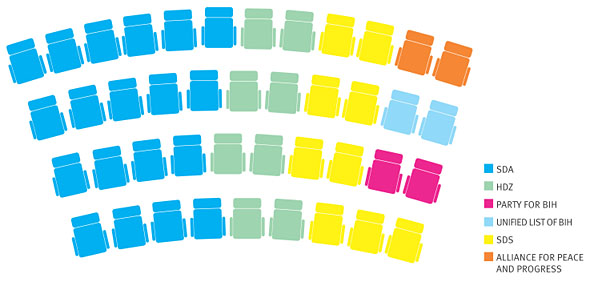
House of Representatives – convocation 1996 – 1998
The initial sessions of the Houses were marked with the issuance of standard procedural decisions: verification of the representatives’ mandates, the signing of a solemn declaration, adoption of the temporary Rules of Procedure for the Houses, and verification of Co-Chairmen Haris Silajdžić and Boro Bosić, and the Ministers and Deputy Ministers in the Council of Ministers, which at that time had no more than three ministers. Furthermore, the members of the Committees were elected (Committee on Constitutional and Legal Affairs, Committee on International and Foreign Affairs, Committee on Foreign Trade and Customs, Committee on Finances and Budget, Committee on Human Rights, Committee on Traffic and Communications, Committee on Administrative Matters, and the Verification Committee), as well as the delegations to the Parliamentary Assembly of the Council of Europe, OSCE and the Inter-Parliamentary Union.
At the beginning of the mandate, the laws for a quick beginning were adopted, of which the following are particularly important: the Law on the Central Bank of Bosnia and Herzegovina, the Law on Foreign Debt, the Law on Foreign Trade Policy, the Customs Policy Law and the Law on the Customs Tariff, the Law on the Council of Ministers and Ministries, the Law on Travel Documents, the Law on the Customs Tariff of Bosnia and Herzegovina and the Law on the Official Gazette of Bosnia and Herzegovina. The Law on the Flag of Bosnia and Herzegovina did not win support; therefore, an interim Law on the Flag of Bosnia and Herzegovina came into force and was enacted by the High Representative 1. The Draft Law on Citizenship of Bosnia and Herzegovina did not win majority support and was not adopted as a consequence (On January 1, 1998, the Interim Law on Citizenship of Bosnia and Herzegovina came into force and was enacted by the High Representative). Many initiatives were launched and interesting issues raised, such as the establishment of a uniform league for sports competitions (it is interesting that the football Premier League of Bosnia and Herzegovina came into existence in the 2002/2003 season), including normalization of railway traffic in Bosnia and Herzegovina. At that time, the committee for investigation of inter-entity corruption and crimes was also established. A conclusion was rendered for the materials to be obligatorily distributed to the representatives in the language and alphabet of the constituent people to which they belong. A request was submitted for the Assembly documents to be delivered to the Republic of Srpska representatives and delegates in cyrillic and in the ekavian dialect.
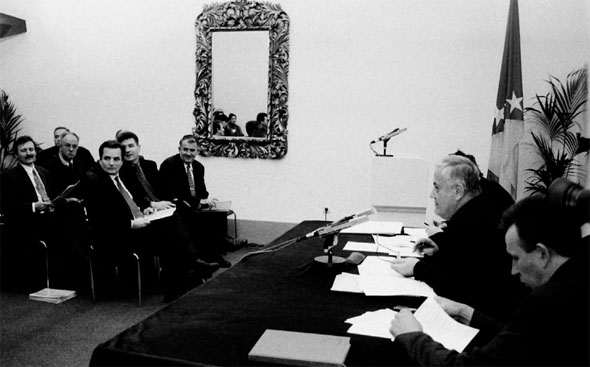
Session of the first lineupof the House of Peoples
The next sessions adopted the following laws: the Law on the Execution of the Budget of Bosnia and Herzegovina Institutions and Bosnia and Herzegovina’s International Responsibilities in 1997, the Law on Foreign Investments in Bosnia and Herzegovina, the framework Law on the Privatization of Enterprises and Banks in Bosnia and Herzegovina, and consent was granted for the loan agreements for four World Bank projects (a loan for a forestry project, a structural adjustment loan, the urgent reconstruction of electro-energy systems and a speedy load pilot-project), and to the Loan Contract between our country and the European Bank for Reconstruction and Development (development credit for reconstruction of the natural gas system, for reconstruction support and for the establishment of an electro-energy system and, afterwards, for the project of urgent telecommunication reconstruction). Consent was also given to the ratification of the Agreement with the London Club creditors, an agreement on the loan of the International Fund for Agricultural Development (IFAD), and agreements with Slovenia, Turkey, Belgium, Iran and Sweden.
The beginning of the first convocation of the Parliamentary Assembly of Bosnia and Herzegovina was difficult. This is understandable considering the recently ended war and the high extent of mistrust between the members of the Parliamentary Assembly of Bosnia and Herzegovina. This was particularly manifested at the time of the first convocation, which was followed by a true drama as to “on whose side” – in Sarajevo or in Lukavica – the sessions would take place. As a result, it would have been primetime news had the representatives even gathered and held a session. In time, the tensions eased, which resulted in the enactment of laws and the adoption of international agreements and appointments. Most importantly, it appears that the Parliamentary Assembly of Bosnia and Herzegovina took hold, thus dissipating the doubts of many people who experienced it only formally, contributing to the understanding that it would indeed be a state institution.
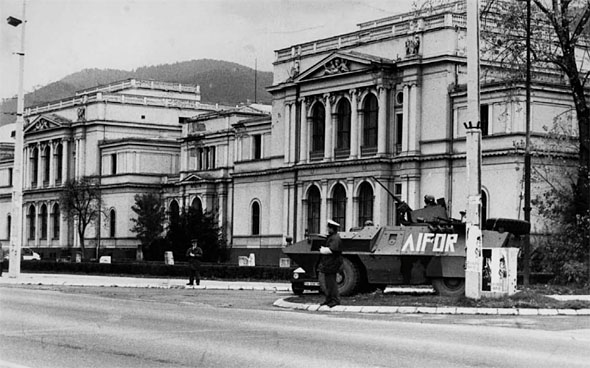
Building of the National Museum in Sarajevo – the first sessions of the first lineup of the Parliamentary Assembly of Bosnia and Herzegovina were held in the buildings of the National Museum and the School of Electrical Engineering in Lukavica
Second convocation of the Parliamentary Assembly of Bosnia and Herzegovina (1998–2000)
In autumn 1998 the second post-war parliamentary elections were held in our country, which also brought some novelties compared to previous elections. This was apparent above all in the fact that after the elections had been held, the number of parties and coalitions in the Parliamentary Assembly increased. Thus the political picture began to slightly change and the domination of the Party for Democratic Action (SDA), the Serbian Democratic Party (SDS) and the Croatian Democratic Union (HDZ) deteriorated to a certain extent. Still, the majority of seats, namely 14 in the House of Representatives of the Parliamentary Assembly of Bosnia and Herzegovina from the Federation of Bosnia and Herzegovina were won by the Coalition for a United and Democratic Bosnia and Herzegovina (based around the Party for Democratic Action). The Social Democratic Party of Bosnia and Herzegovina (SDPBiH) was represented by four representatives, the Social Democrats of Bosnia and Herzegovina by two and the National Democratic Union of Bosnia and Herzegovina (DNZBiH) by one. The Croatian Democratic Union of Bosnia and Herzegovina (HDZBiH) won six seats and the Coalition New Croat Initiative (NHI) – Croatian Christian Democrat Union (HKDU) one seat. From the Republika Srpska, three seats belonged to the Coalition for a United and Democratic Bosnia and Herzegovina, the Republic of Srpska’s Serbian Radical Party won two and the Republic of Srpska’s Radical Party one seat. The majority of seats, four in total, were each won by the Coalition Sloga and the Serbian Democratic Party (SDS) list.In the first eight months the House of Representatives was chaired by Halid Genjac from the Coalition for a United and Democratic Bosnia and Herzegovina. That duty was then assumed by Mirko Banjac from the SDS, and finally by Pero Skopljak from HDZ BiH.The first chairman of the second convocation of the House of Peoples was Vladimir Šoljić. When his term ended after eight months, he was replaced by the first co-chairman at the time, Izet Žigić, while for the last eight months the duties of the chairman were performed by Drago Ljubičić. By the second mandate the practice of holding sessions alternately at the National Museum in Sarajevo and the Electro-technical faculty in Lukavica was abandoned. The session held in the building of the Parliament in Marijin Dvor in Sarajevo on November 26, 1998 was the first since 1992. During this mandate, the House of Representatives and the House of Peoples held 26 and 24 sessions, respectively.
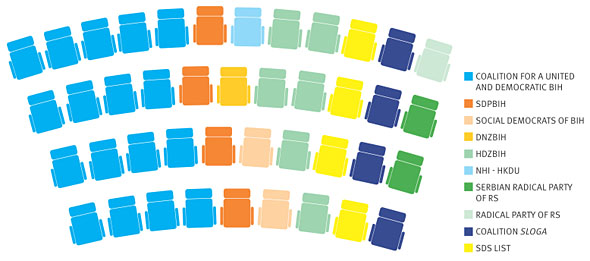
House of Representatives – convocation 1998–2000
The initial sessions of the second convocation were held under the standard procedure: mandate verification, election of a chairman and his/her deputies, and the appointment of committee members. The Law on the Amendment to the Law on the Travel Documents of Bosnia and Herzegovina was adopted unanimously. Furthermore, much attention was paid to preparation for the Madrid Conference. The next session confirmed the appointment of Haris Silajdžić and Svetozar Mihajlović as minister and deputy minister, respectively, to the Council of Ministers of Bosnia and Herzegovina, on which occasion several parliamentary delegations were also appointed.
The following laws were adopted at the sessions of the Houses: the Law on the National Anthem of Bosnia and Herzegovina (of three proposals, the first proposal for the hymn titled “Intermezzo” won the required majority vote. 26 representatives, 15 from the Federation of Bosnia and Herzegovina and 11 from the Republic of Srpska, voted for this proposal, while five representatives against it), the Law on Communications, the Framework Law on the Privatization of Enterprises and Banks in Bosnia and Herzegovina, the Law on Aviation of Bosnia and Herzegovina, the Law on Citizenship of Bosnia and Herzegovina, the Law on the Revision of Institutions of Bosnia and Herzegovina, the Law on Immigration and Asylum of Bosnia and Herzegovina, the Law on Refugees from Bosnia and Herzegovina and Displaced Persons in Bosnia and Herzegovina, the Law on the Funding of Political Parties in Bosnia and Herzegovina, the Law on Staffing a Vacant Post of a Member of the Presidency of Bosnia and Herzegovina, the Law on the Treasury of Bosnia and Herzegovina Institutions, the Law on Free Access to Information in Bosnia and Herzegovina, the Law on the Procedure of Concluding and the Execution of International Treaties, as well as consent granted for the ratification of several international agreements and contracts.
The procedure for the enactment of laws and other acts in cases where the proponent of which was not the Council of Ministers or the Presidency of Bosnia and Herzegovina was defined as well. It was also decided to have an Interim Secretariat of the Parliamentary Assembly of Bosnia and Herzegovina established, and a Decision on the organization of the Secretariat of the Parliamentary Assembly of Bosnia and Herzegovina was rendered afterwards. The adoption of the Standing Orders for the House of Representatives and the House of Peoples was very important for their work.
In early June 2000, Spasoje Tuševljak was appointed Chairman of the Council of Ministers of Bosnia and Herzegovina, and four months later, at the last session of the second convocation of the House of Representatives, he was replaced by Martin Raguž.
The second convocation achieved many more results than the first, as expected. A large number of laws were accepted, consent was granted for the ratification of a number of agreements, successful cooperation was established with other institutions among Bosnia and Herzegovina authorities and Standing Orders for both Houses were adopted. Although many draft laws were dismissed, considering the specifics of the state organization, such a situation was expectable and quite understandable. Regardless, both formally and essentially, the Parliamentary Assembly of Bosnia and Herzegovina continued its development over these two years, and proved to be the body of a developed parliamentary democracy.
Third convocation of the Parliamentary Assembly of Bosnia and Herzegovina (2000 – 2002)
After the elections held in autumn 2000, the Social Democratic Party of Bosnia and Herzegovina (SDPBiH) had the most reason for satisfaction. The Social Democratic Party of Bosnia and Herzegovina (SDPBiH) won nine representative seats, eight from the Federation of Bosnia and Herzegovina and one from the Republic of Srpska. One seat less was won by the Party for Democratic Action (SDA) in the House of Representatives, while the Serbian Democratic Party (SDS) won six seats. Five representative mandates each were won by the Party for Bosnia and Herzegovina and the Croatian Democratic Community, and two seats were won by the Party of Democratic Progress of Republic of Srpska (PDPRS). The following parties won one seat each: the New Croat Initiative (NHI), the Serbian National Party (SNS), Social Democrat Party (DSP), Socialist Party of Republic of Srpska (SPRS), National Democratic Union (DNZ), Coalition of the Alliance of Independent Social Democrats (SNSD) – and the Social Democrat Party (DSP), and the Bosnian Party of Rights (BSP). At the constituent assembly of the House of Representatives, Sead Avdić, Željko Mirjanić and Mariofil Ljubić were appointed the Chairman and co-chairmen, respectively. Božidar Matić, candidate of the Alliance for Changes, was appointed the Chairman of the Council of Ministers of Bosnia and Herzegovina. It is interesting that the first session of the House of Peoples was held on March 20, 2001. Once the peoples’ caucuses were established, the following chairman and co-chairmen were appointed: Ilija Šimić, Sejfudin Tokić and Nikola Špirić. At the March sessions of both Houses, the members of the Presidency of Bosnia and Herzegovina were appointed as follows: Beriz Belkić on behalf of Bosniaks and Jozo Križanović on behalf of Croats. During this mandate, the House of Representatives and the House of Peoples held 32 and 25 sessions, respectively. The sessions of both Houses held in April and May 2001 will be remembered for the adoption of a large number of draft laws at their first reading (among others, the Law on the Flag of Bosnia and Herzegovina, the Law on the Coat of Arms of Bosnia and Herzegovina, the Law on the National Anthem of Bosnia and Herzegovina and the Law on the Foreign Trade Chamber). Furthermore, consent was granted for the ratification of a large number of agreements and treaties (with Croatia, Switzerland and Greece).
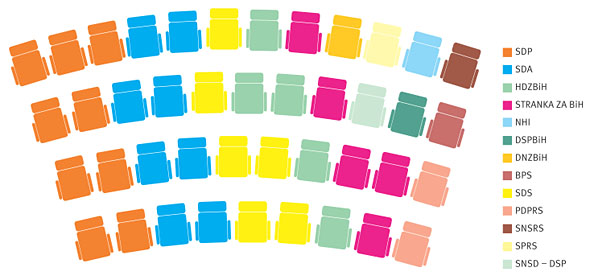
House of Representatives – convocation 2000 – 2002
By the summer recess, members of the Parliamentary Assembly of Bosnia and Herzegovina enacted several laws: the Law on the Flag of Bosnia and Herzegovina, the Law on the Coat of Arms of Bosnia and Herzegovina, the Law on the State Border Service of Bosnia and Herzegovina, the Law on Free Zones in Bosnia and Herzegovina, and the Law on Amendments and Supplements to the Law on Travel Documents of Bosnia and Herzegovina. The Law on Amendments and Supplements to the Law on the Council of Ministers of Bosnia and Herzegovina was also adopted. At the 4th session of the House of Representatives held on February 22, 2001, Božidar Matić was appointed the Chairman of the Council of Ministers, and less than five months later, upon his resignation, Zlatko Lagumdžija was appointed to that office during the 12th session of the House of Representatives on July 18, 2001. The adoption of the Resolution on Trust and Reconciliation in Bosnia and Herzegovina and the Resolution on Economic and Social Policy in Bosnia and Herzegovina were also important.
In the months that followed, the Houses met frequently and their agenda was usually busy. A large number of laws were adopted, and the following are particularly noteworthy: the Bosnia and Herzegovina Election Law, the Law on Archive Materials and the Archive of Bosnia and Herzegovina, the Law on the Identity Cards of Citizens of Bosnia and Herzegovina, the Law on Central Records and Exchange of Data of Bosnia and Herzegovina, the Law on the Place of Residence and Dwelling of Citizens of Bosnia and Herzegovina, and the Law on the Purpose and the Use of Property of Bosnia and Herzegovina obtained under the Agreement on Succession Issues of the former Yugoslavia. Consent was granted for the ratification of several agreements and treaties (especially those signed with the USA and the Loan Contract concluded with the European Bank for Reconstruction and Development for the railway reconstruction project).
Some laws were the subject of public hearings at several sessions of the Assembly during the last months of 2002, and were eventually adopted upon adjustments: the Law on the Foreign Trade Chamber of Bosnia and Herzegovina, the Law on Amendments and Supplements to the Law on the Foreign Debt of Bosnia and Herzegovina, the Law on Industrial Property in Bosnia and Herzegovina, the Law on International and Inter-Entity Road Traffic, and the Law on the Societies and Foundations of Bosnia and Herzegovina. In addition, the Decision on Amendments to the Standing Orders of the House of Representatives was unanimously adopted, as were the Resolution on Missing Persons in Bosnia and Herzegovina, the Resolution on the Commitment of Bosnia and Herzegovina to admission to full membership of the Council of Europe. During the first two months of 2002, most attention was paid to those draft laws which had not been supported at the end of the past year. The work of the Committees and adjustments resulted in the adoption of the following: the Law on Demining in Bosnia and Herzegovina, the Law on the Establishment of the Accreditation Institute of Bosnia and Herzegovina, the Law on Amendments and Supplements to the Customs Policy Law of Bosnia and Herzegovina, the Law on Free Zones in Bosnia and Herzegovina and the Law on Civil Service in the Institutions of Bosnia and Herzegovina. Apart from this, representatives and delegates granted their consent for ratification of a large number of agreements, contracts and conventions (with Italy, Austria, Slovenia, Croatia, the United Nations, Switzerland, Hungary and Kuwait).
During 2002 the Parliament was very active, which was reflected in the number of sessions and variety of issues that were the subjects of public hearings. Several sessions of the House of the Parliamentary Assembly of Bosnia and Herzegovina were held and resulted in the adoption of the following: the Law on Copyright and Related Rights in Bosnia and Herzegovina, the Law on the Use of the Red Cross Sign of Bosnia and Herzegovina, the Law on the Public Attorney’s Office, the Law on the Protection of Consumers of Bosnia and Herzegovina, the Law on the State Administration of Bosnia and Herzegovina, the Law on the Agency for Information and Protection of Bosnia and Herzegovina, the Law on the Protection of the Rights of National Minorities, the Law on Civil Service in the Institutions of Bosnia and Herzegovina, the Law on Ombudsmen of Bosnia and Herzegovina, the Law on Concessions of Bosnia and Herzegovina, the Law on the Public Radio- Television Service of Bosnia and Herzegovina, the Law on the Court of Bosnia and Herzegovina, the Law on Amendments and Supplements to the Law on Industrial Property in Bosnia and Herzegovina, the Law on Decorations, the Law on the Use and Protection of the Name of Bosnia and Herzegovina, the Law on Amendments and Supplements to the Law on Aviation of Bosnia and Herzegovina, the Law on the City of Sarajevo – the Capital of Bosnia and Herzegovina, the Law on Veterinary Medicine of Bosnia and Herzegovina, and the Law on Farming Cooperatives. Consent was granted to several agreements and treaties (two development loan agreements signed with the International Association for Development were most important and pertained to the economic sector, that is, to business environment adjustment). Several resolutions were also adopted, including: the Resolution on the Youth in Bosnia and Herzegovina and the Resolution on Securing the Human Rights to Citizens of Bosnia and Herzegovina.
At the 22nd session of the House of Representatives held on March 15, 2002, Dragan Mikerević was appointed the Chairman of the Council of Ministers of Bosnia and Herzegovina. Still, undoubtedly the most important step forward was achieved at the session of the House of Representatives, which had only one item on its agenda: public hearings on the execution of the Decision of the Constitutional Court of Bosnia and Herzegovina on the constituency of Bosniak, Croat and Serb peoples and their equality throughout Bosnia and Herzegovina, which decision, as final and binding, had to be consistently executed by the Entity Assemblies.
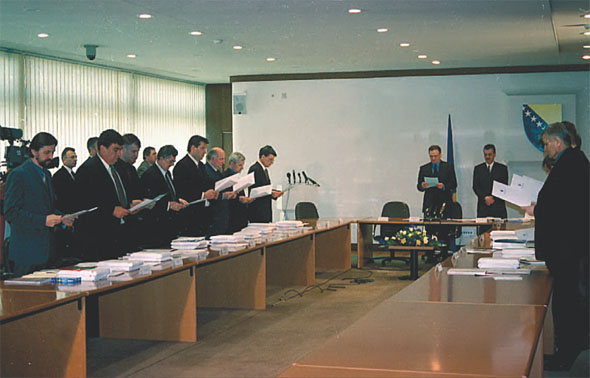
Delegates of the third lineup of the House of Peoples swearing in
However, some draft laws were not supported by the representatives or delegates and were forwarded for further adjustments. This refers to the following: the Draft Law on Statistics, the Draft Law on Holidays of Bosnia and Herzegovina, the Draft Law on the High Judicial and Prosecutorial Council of Bosnia and Herzegovina, and the Draft Law on Aviation of Bosnia and Herzegovina. The Draft Law on Gender Equality did not win support by the entity majority and was forwarded for further adjustment as a consequence. The same happened to the Draft Law on the Movement and Stay of Aliens and Asylum.
With a number of adopted laws, this convocation confirmed that the development of the Parliamentary Assembly had taken an upturn. Owing to the successful activities of the Parliamentary Assembly of Bosnia and Herzegovina that were manifested in the adoption of conclusions on the mandatory constituency of peoples throughout our country, and the adoption of several important resolutions and a number of quality and needed laws, the citizens of Bosnia and Herzegovina had good reason to be optimistic. The fact that the sessions of both Houses were not characterized by offensive language and inter -ethnic tensions, but were dominated by a spirit of cooperation and the wish to achieve as much as possible certainly contributed to this.
The relatively good social-economic situation throughout the country also contributed to this optimism. Therefore, the period could be described as dynamic, both in terms of the post-war development of Bosnia and Herzegovina and the development of the Parliamentary Assembly of Bosnia and Herzegovina into an efficient state institution. Having previously overcome numerous obstacles and challenges, the Parliamentary Assembly of Bosnia and Herzegovina could now proceed with its development followed by ever increasing expectations from the entire public of Bosnia and Herzegovina.
Fourth convocation of the Parliamentary Assembly of Bosnia and Herzegovina (2002 – 2006)
After the elections were held in autumn 2002, ten seats in the House of Representatives were won by the SDA party. The Party for Bosnia and Herzegovina won six seats. A slightly worse election result was achieved by the SDS party, which won five seats. The same number was won by the Coalition HDZ – Christian Democrats. Four seats in the House of Representatives were won by the SDPBiH. Three candidates were elected from the SNSD list, while the PDPRS won two seats. One seat each was won by the following parties: the NHI, DNZBiH, Economic Bloc HDU – For Progress, BOSS, SPUBiH, SPRS, and SRSRS. One of the characteristics of this convocation of the House of Representatives was the large number of independent representatives who left the caucuses of the parties or coalitions to which they had belonged and became independent representatives. Šefik Džaferović, Borislav Paravac and Bariša Čolak were appointed the Chairman and Co-chairmen of the House of Representatives, respectively. Shortly afterwards, Borislav Paravac, who was appointed a member of the Presidency of Bosnia and Herzegovina, was replaced by Nikola Špirić, and Bariša Čolak, who was appointed the Minister in the Council of Ministers, was replaced by Martin Raguž. Velimir Jukić, Mustafa Pamuk and Goran Milojević were elected the Chairman and Co-chairmen of the House of Peoples, respectively.Unlike previous convocations where the mandate of the representatives and the delegates lasted for two years, their mandate was now extended to four years. Therefore, it is not surprising that the House of Representatives held no less than 85 sessions, while the House of Peoples held 63 sessions. At the 5th session of the House of Representatives held on December 23, 2002, the appointment of Adnan Terzić as the Chairman of the Council of Ministers of Bosnia and Herzegovina was confirmed.
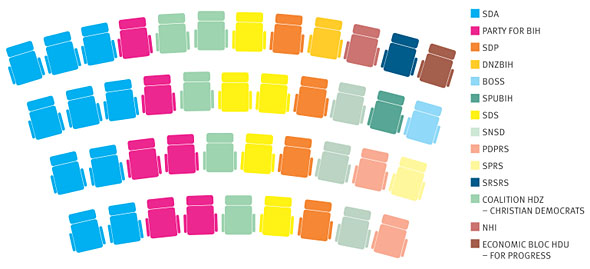
House of Representatives – convocation 2002 – 2006
During 2003, the representatives and delegates adopted a large number of laws, of which the following are particularly noteworthy: the Law on the Import and Export of Weapons and Military Equipment, the Law on Ministries and Other Administrative Authorities of Bosnia and Herzegovina, the Law on the Labor and Employment Agency of Bosnia and Herzegovina, the Law on Gender Equality in Bosnia and Herzegovina, the Law on Executive Proceedings before the Court of Bosnia and Herzegovina, the Law on the Decoration of Bosnia and Herzegovina, the Framework Law on Primary and Secondary Education in Bosnia and Herzegovina, the Interim Law on the Merger of the Customs Administrations into the Indirect Taxation Authority, the Law on the Council of Ministers of Bosnia and Herzegovina, the Law on Communications, the Law on the Indirect Taxation System in Bosnia and Herzegovina, the Law on Court Charges in the Proceedings before the Court of Bosnia and Herzegovina, and the Law on Aviation of Bosnia and Herzegovina. The laws imposed by the High Representative were also adopted: the Law on Amendments to the Law on Citizenship of Bosnia and Herzegovina, the Criminal Procedure Code of Bosnia and Herzegovina, the Criminal Code of Bosnia and Herzegovina, the Law on Court Police, the Law on the Movement and Stay of Aliens and Asylum, the Law on the Protection of Witnesses under Threat and Vulnerable Witnesses.
Over this period of time, the representatives and delegates accepted many amendments and supplements to the previous laws, notably: to the Law on Refugees from Bosnia and Herzegovina and Displaced Persons in Bosnia and Herzegovina; the Law on International and Inter-Entity Road Traffic; the Law on the Central Bank of Bosnia and Herzegovina; the Law on Transmission, Regulation and Operation of the Electric Power System; the Law on Direct Foreign Investment Policy in Bosnia and Herzegovina; the Law on Free Zones in Bosnia and Herzegovina; the Law on Associations and Foundations of Bosnia and Herzegovina; the Law on the Import and Export of Weapons and Military Equipment; the Law on Civil Service in the Institutions of Bosnia and Herzegovina; the Election Law of Bosnia and Herzegovina; the Law on the Council of Ministers of Bosnia and Herzegovina. Consent was granted for the ratification of a large number of various agreements, contracts, conventions, protocols and memorandums (most problems were caused by the ratification of the Agreement between Bosnia and Herzegovina and the United States on the surrender of persons to the International Criminal Tribunal; however, after a lengthy discussion, consent was given to the ratification of this agreement as well).
Apart from the foregoing, the following is also noteworthy: the adoption of the Measures and Action Plan to Improve the Security Situation in Bosnia and Herzegovina (with regard to this, the document titled “Security Policy of Bosnia and Herzegovina,” which was submitted by the Presidency of Bosnia and Herzegovina, was also supported), lengthy discussions on Corridor Vc, discussions on the so-called coup which resulted in the establishment of the committee for the investigation of the case, and the appointment of the ombudsmen for human rights in Bosnia and Herzegovina. At the sessions of both Houses held in 2004, many laws were adopted, of which the following are particularly noteworthy: the Law on Freedom of Worship and Legal Status of Churches and Religious Communities in Bosnia and Herzegovina; the Law on the Intelligence-Security Agency of Bosnia and Herzegovina; the Law on Police Officers of Bosnia and Herzegovina; the Framework Law on Higher Education in Bosnia and Herzegovina; the Law on the Establishment of the Electric Power Transmission Company; the Law on the Importance of Public Documents; the Law on the High Judicial and Prosecutorial Council of Bosnia and Herzegovina; the Law on Accountancy and Auditing of Bosnia and Herzegovina; the Law on the Foreign Trade Policy of Bosnia and Herzegovina; the Law on the Public Radio-Television Service of Bosnia and Herzegovina; the Customs Policy Law of Bosnia and Herzegovina; the Law on the State Border Service of Bosnia and Herzegovina; the Law on the Funding of the Institutions of Bosnia and Herzegovina; the Value Added Tax Law of Bosnia and Herzegovina; the Law on the Sales Tax on Products and Services; and the Excise Law. Furthermore, amendments and supplements to a range of previously passed laws were adopted.
During the same period of time both Houses granted their consent to a range of agreements, contracts, conventions, protocols and memorandums (most often economic contracts with the European countries, and several loan agreements with the European Bank for Reconstruction and Development). With regard to other developments, there were frequent discussions of methods for the protection of domestic production (plans within the project “Let’s Buy Domestic Products”), continued discussions on Corridor Vc and reforms needed in Bosnia and Herzegovina, including the need to ethnically balance personnel in the institutions of Bosnia and Herzegovina.
However, defence reform was allocated the most time during this period of Parliament through the enactment of the Law on Defence, the appointment of the first Minister of Defence (thus expanding the Council of Ministers to nine Ministries) and the confirmation of the appointment of candidates for the rank of General in the Armed Forces of Bosnia and Herzegovina, which was successfully completed by mid-2004. Special reference should be given to the adoption of the Statement on Obligations Satisfied by Bosnia and Herzegovina under the Study of Feasibility for the purpose of the beginning of negotiations over the Agreement of Stabilization and Association with the European Union.
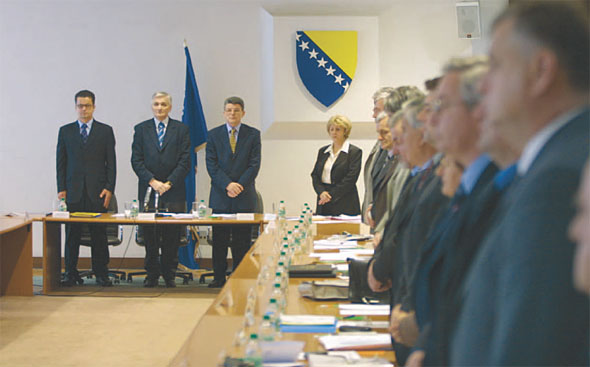
The national anthem is being played before the beginning of a session of the House of Representatives’ fourth lineup
By the end of this mandate, the following laws successfully passed the parliamentary procedure and were adopted: the Law on PTT Offices of Bosnia and Herzegovina; the Law on Competition; and the Law on the Railways of Bosnia and Herzegovina. It is noteworthy that the amendments and supplements to the earlier legal acts were adopted as follows: the Law on the Central Bank of Bosnia and Herzegovina; the Law on Labor in the Institutions of Bosnia and Herzegovina; the Law on State Investigations and Protection Agency; the Law on the Protection of National Minorities; the Law on the Value Added Tax; the Law on the Protection of Confidential Information; the Law on Traffic Safety on Bosnia and Herzegovina Roads; the Law on Enforced Collection of Indirect Taxes in Bosnia and Herzegovina; the Law on the Indirect Taxation Authority; the Law on Serving in the Armed Forces of Bosnia and Herzegovina; the Law on the Public RTV Service of Bosnia and Herzegovina; the Law on Consumer Protection of Bosnia and Herzegovina; the Law on the Settlement of Debts Arising from Old Foreign Currency Savings; the Law on Classification of Professions in Bosnia and Herzegovina; the Law on the Protection of Personal Details, and the Law on Free Access to Information in Bosnia and Herzegovina.
Members of both Houses also discussed the topical issue of the involvement of the Armed Forces of Bosnia and Herzegovina in peace missions. Consent was granted for the ratification of a large number of agreements, contracts, conventions and memorandums with foreign countries, banks and loan institutes. Ivo Miro Jović was elected as the Croat member of the Presidency of Bosnia and Herzegovina. During that period of time, the issuance and design of passports and registration plates were the subjects of interesting discussions at the sessions. There were many discussions as a consequence of the analysis of the foreign trade deficit of our country, wherein special emphasis was given to the analysis of the results of the Council of Ministers’ Decision on the temporary suspension of a zero customs rate under the Free Trade Agreements with Serbia and Montenegro, and Croatia, the Framework Law on Higher Education in Bosnia and Herzegovina, and donations Bosnia and Herzegovina received from 1996 to 2005. In addition, after tumultuous debates, the Resolution on Antifascism was also adopted.
Among other parliamentary successes, the following are noteworthy: the Decision on the acceptance of the Agreement on the reform of Bosnia and Herzegovina Police Structures, adoption of the Decision on the organization of the Secretariat of the Parliamentary Assembly of Bosnia and Herzegovina, adoption of the Decision on the Establishment of the Council of Bosnia and Herzegovina National Minorities, and the adoption of the Policy Paper on Concession Granting in Bosnia and Herzegovina. In addition, the dismissal of the information on the legal effects of the introduction of the value added tax in the period January-March 2006 should be mentioned. Much attention was also paid to the activities of the Bosnia and Herzegovina Intelligence-Security Agency, the participation of Bosnia and Herzegovina Armed Forces in peace operations, Corridor Vc, and the Public RTV system.
Parliamentary activities in 2006 were marked by an attempt to reform the Constitution in late April (the April Package of Changes). That was preceded by an agreement among six political parties (the SDA, SDPBiH, SDS, HDZ, SNSD and PDP), which was signed on March 18. Based on that agreement, the Presidency of Bosnia and Herzegovina defined the draft amendments to the Constitution of Bosnia and Herzegovina and put them into the parliamentary procedure. There are many of those who believe that this was the most significant political event in Bosnia and Herzegovina after the Dayton Agreement. This constitutional reform was aimed at establishing more efficient and rational state institutions on the path of our country towards EU and NATO membership. This matter was the subject of a public hearing of the House of Representatives held on April 25 and 26. On the first day, the session lasted until 2 am, and continued the following day until the afternoon. Eventually, after many presentations, rebuttals and expressions of views by the caucuses and representatives, they were put to the vote and 26 representatives voted in favor of the amendments, while 16 representatives voted against them. The amendments were not adopted because they required a two-thirds majority vote.
The fourth convocation of the Parliamentary Assembly of Bosnia and Herzegovina achieved much with regard to the exercise of the constitutional functions in solving accumulated problems. No doubt the adoption of the Law on Defence of Bosnia and Herzegovina within the armed forces reform was most important, as was the beginning of police force reforms in Bosnia and Herzegovina, which process was completed at a later point in time, during the mandate of the next Parliamentary Assembly. Furthermore, an attempt to reform the Constitution, which failed at the sessions held in late April 2006, is also worth mentioning.
Fifth convocation of the Parliamentary Assembly of Bosnia and Herzegovina (2006 – 2010)
After the elections held in early October 2006, the House of Representatives looked as follows (see next page). Nine seats in the House of Representatives were won by the SDA, while the Party for BiH also achieved an excellent election result with eight seats. The best election results in the Republika Srpska were achieved by the Alliance of Independent Social Democrats (SNSD) which won seven seats.
The Social Democratic Party of Bosnia and Herzegovina (SDPBiH) won five seats in the House of Representatives, while three seats were won by the Croatian Democratic Union of Bosnia and Herzegovina (HDZBiH) Croatian Coalition – and the Croatian National Union (HNZ). The same number of seats was won by the Serbian Democratic Party (SDS). From the Croatian Alliance (HDZ 1990 – HZ – HSS – HKDU – HDU), list, two candidates were elected, while one seat each was won by the Party for Democratic Progress of the Republika Srpska (PDPRS), the National Democratic Union of Bosnia and Herzegovina (DNZBiH), People’s Party Work for Progress (orig. Narodna stranka Radom za boljitak), Democratic People’s Alliance (DNS) and the Bosnian Patriotic Party (BPS). The following persons were elected members of the Bureau of the House of Representatives, that is, the Chairman and two Co-chairmen: Milorad Živković, Niko Lozančić and Beriz Belkić.
As stipulated by the Constitution, delegations to the House of Peoples also took place within the foreseen timeline. The following persons were elected members of the Bureau of the House of Peoples: Sulejman Tihić, Mladen Ivanić (who was replaced by Dušanka Majkić in 2009, as the Party of Democratic Progress turned into the opposition) and Ilija Filipović.
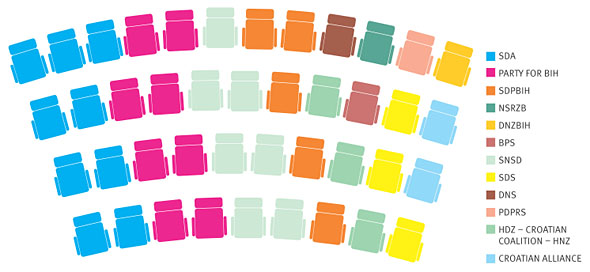
House of Representatives – convocation 2006 – 2010
With these mandates 83 sessions of the House of Representatives and 49 sessions of the House of Peoples were held. Along with their ordinary parliamentary activities, the members of both Houses have also been active in the work of numerous committees which are aimed at speedy and more efficient work towards the faster adoption of the laws and other acts required for satisfying European standards and bringing our country closer to Euro-Atlantic integration.
The signing of the Agreement on Stabilization and Association with the European Union can be deemed a great success, as it is a step forward toward full European Union membership. The Parliamentary Assembly of Bosnia and Herzegovina played a very important role in this process, and in October 2008 gave its consent to the ratification of the Agreement on Stabilization and Association with the European Union.
With regard to this convocation of the state Parliament, the adoption of the Law on Police Structures in Bosnia and Herzegovina, as the adoption put an end to the police reform in our country, and Amendment 1 to the Constitution of Bosnia and Herzegovina should be emphasized. Along with this, the representatives and the delegates have still paid much attention to the issue of the protection of domestic production.
* * *
In the decade and a half of its existence, the Parliamentary Assembly of Bosnia and Herzegovina has come a long way, from an institution for which it was initially a success merely to gather its elected representatives and delegates, to becoming a more or less effective working body, and at present prepared to pass laws which will both secure a better life for all citizens of Bosnia and Herzegovina, regardless of their ethnicity or religion, and move the country closer to the European Union.
In this period the Office of the High Representative had an important role in the work of the Parliamentary Assembly of Bosnia and Herzegovina. The High Representative imposed a number of laws, which were subsequently reviewed and affirmed by the Parliamentary Assembly of Bosnia of Herzegovina.
The Parliamentary Assembly of Bosnia and Herzegovina has justified its existence by exercising a large number of the roles it has been entrusted with under Annex IV to the Peace Agreement. In the future, the Parliamentary Assembly will face the demands and tasks of strengthening state power, developing and stabilizing our society and rapidly implementing reforms along the path towards Euro- Atlantic integration.
1: The duties of the High Representative in Bosnia and Herzegovina are set forth in Article II of Annex X of the Dayton Peace Accords; his primary task is to monitor and aid the implementation of the peace accords. In order to strengthen his role and position in the process of implementation of the Peace Accords, in 1997, the Peace Implementation Council authorized the High Representative to impose laws in case the legislative bodies in Bosnia Herzegovina are unable to pass them, as well as to relieve Bosnia and Herzegovina officials of their duties in case they violate their obligations as set forth in the law.

